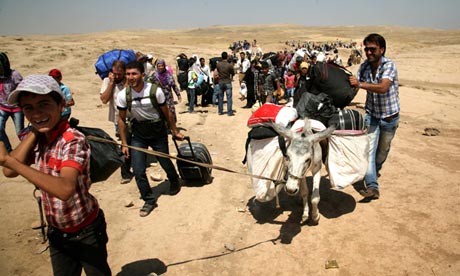The Spreading Conflict
"UN refugee agency staff at Sahela report what appears like a river of people coming towards the border. We are witnessing a major exodus from Syria over the past few days unlike anything we have witnessed entering Iraq previously."
Claire Bourgeois UNHCR Iraq representative
"This is an unprecedented influx of refugees, and the main concern is that so many of them are stuck out in the open air at the border or in emergency reception areas with limited, if any, access to basic services."
Alan Paul, Save the Children emergency team leader

Syrian refugees cross
the border into the autonomous Kurdish region of northern Iraq on
Sunday. Photograph: Safin Hamed/AFP/Getty Images
During the invasion of Iraq by the United States and the Coalition of the Willing, Syrian borders were porous sieves for the entrance of Syrian, Saudi, Somali and other-sourced Sunni terrorists aligned with al-Qaeda. Now Syrians are streaming in the opposite direction, through Syria and into Kurdish-dominated and -administered Iraq, for haven from the Sunni, al-Qaeda-linked Nusra terrorists battling the Kurdish militias, for fear of their lives.
It is mostly the elderly Kurds, women and children who comprise the bulk of the thousands streaming through from Kurdish Syria to haven in Kurdish Iraq, straining the capabilities to meet their very basic human needs for survival. Turkey can be held responsible for much of what has been occurring with the Syrian Kurds. Fearful of an alliance between Iraqi, Syrian and Turkish Kurds agitating for a homeland of their own, Istanbul has encouraged Sunni Islamist predation on Syria's Kurds.
To keep them busy, battling for their own survival against the brutal battlefield skills of seasoned Sunni Islamists and therefore less likely to infuse Turkey's Kurds with whom President Recep Tayyip Erdogan recently signed an agreement, with the urge to rise against the government of Turkey yet again. Attacks fomented by Turkey on Kurdish territories have become more frequent latterly, according to Hassan Muhammad, representative of the Kurdish Democratic Union in Europe.
“This is a planned campaign, and the militia is now blockading the Kurdish area,” he said. “It’s the worst in Ain Al-arab, which is surrounded by the Turkish border and, from three other sides, by terrorist battalions like Jabhat Al-Nusra and the Islamic state of Iraq and the Levant. We confirmed that terrorists have arrested hundreds of people, especially in Tel Hasel and Tel Aran, and there are still hundreds of people missing. Families, who reached us from Afreen told us about those crimes… those crimes are against humanity, and punishment must take place by international law.”

While the Syrian military has withdrawn from the area held by the Kurds, preferring to focus instead on more vulnerably defensible areas useful to the government that the regime intends to claw back from rebel hands, the way has been left clear for Sunni Islamists to attack the Kurds who have until the last short while, demonstrated a non-involvement inclination in the fight by Syrian Sunnis against their Alawite government of minority Shias.
Without Turkey's malign interference the Sunni Islamists would doubtless meet in conflict with Hezbollah and the regime military. More recently Kurdish militias and anti-government jihadists have clashed. The Kurdish areas offer a passage to Sunni militants in Iraq. Massoud Barzani, president of Iraq's semi-autonomous Kurdish area sharing a border with northeast Syria threatened to enter Syria to intervene if further attacks against Kurds in Syria continue.
If Kurds, he claimed, were "under threat of death and terrorism", it naturally followed that Iraqi Kurdistan would then be "prepared to defend them", thus opening the geography to yet another war front. One that would, in its far-reaching effects, bring in Turkish Kurds as well, and precipitate precisely what Turkish President Recep Tayyip Erdogan is so anxious to avoid, casually sacrificing innocent Kurdish lives in Syria in the process.
Turkey will be confronted with a widening and more aggressive, vengeance-seeking Kurdish army well skilled in combat in Iraq which once fought for its independence against Saddam Hussein. In the meantime, the emergency for countless thousands of civilian Kurds desperate to escape violence and death in Syria continue to inundate Iraq. Leaving the UN to work with the government in Iraqi Kurdistan for the establishment of a camp sufficient to accommodate new arrivals.
As for the government of Syria, President Bashar al-Assad has reiterated his vows to continue the conflict, emphasizing that he remains "determined to confront terrorism and eradicate it." The terrorists of whom he originally spoke back when the Sunni Syrians protested and asked that they be given equal rights to their Shia oppressors simply did not exist, although he evoked their presence to the international community as reason for his brutal crack-down on his own civilians.
Leading inevitably to the creation of the Syrian Free Army militias and the gradual influx of Sunni terror groups to fight alongside the Syrians, grateful for assistance at first, then increasingly concerned about the agenda of the Islamists whom it became abundantly clear had a plan for Syria inconsistent with the one that native Syrians themselves hoped for.
And now, Bashar al-Assad can triumphantly cite his opponents as representative of 'foreign terrorists', at last.
Labels: Conflict, Islamists, Kurds, Revolution, Security, Syria, Turkey

<< Home